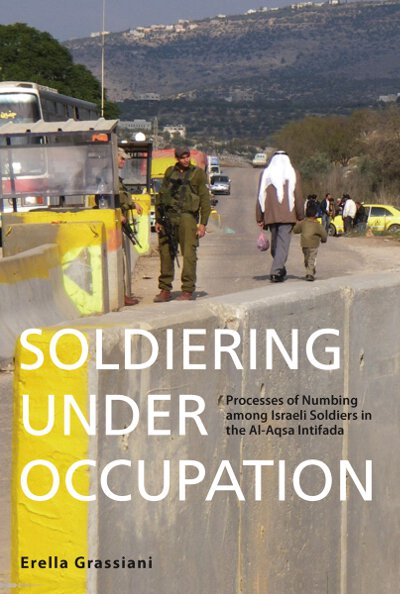Understanding a soldier is key to understanding the effect of militarism on a broader society, according to Erella Grassiani, author of Soldiering Under Occupation: Processes of Numbing among Israeli Soldiers in the Al-Aqsa Intifada. The volume, published in July, offers insights into the physical and mental effects that operating in occupied zones has on soldiers. Below, Grassiani discusses the volume, her occupation, and how she enjoys her down time.
__________________________________________________

Berghahn Books: What drew you to the study of the Israeli military? And why is this topic important?
Erella Grassiani: I was born in Israel and even though I was raised largely in the Netherlands, Israel stayed close to my heart. When I went back to Israel to study at the Tel Aviv University I came across ideas about militarism for the first time and the way the military influenced civilian life.
I was hooked immediately on the topic, as this influence also became more and more visible in my own life in Israel. That was the beginning of my intellectual ‘journey’ into the matter, ending up with my Ph.D. research on moralities of combat soldiers in the Occupied Palestinian Territories.
I believe this topic to be so important because it shows us how military and society are entwined, what militarization of a society does to people, and how it shapes the way they interpret their daily lives and the people around them. This is of course especially true in a society such as the Israeli one, where ‘things military’ and security issues are so normalized. More specifically, I believe that studying experiences of soldiers is very crucial to our understanding of (modern) violent conflict. While anthropologists usually study ‘down’ and are interested in victims of violence and the marginalized, I believe that it is equally important to study power holders, the soldiers who engage in the violence, in order to understand processes that they go through, the way their behavior is shaped by the situation they find themselves in, the spaces they work in and also the social background they come from. Studying the (moral) experiences of soldiers who work within an occupation can teach us much about the way systems (military/state) can influence behavior of soldiers everywhere around the world.
BB: Did any perceptions on the subject change from the time you started your research to the time you completed the book?
EG: I think the way that the behavior of soldiers is very systemic was something I learned more and more through the research and the writing process. Also the realization of the important influence of the spaces soldiers work within came with time.
BB: What aspect of writing this work did you find most challenging? Most rewarding?
EG: I guess any writer goes through several phases in writing, for me the most challenging was to delete a whole chapter when I realized I did not need it for my argument! A lot of work went into that text, but I’m happy I took it out. Most rewarding was the last phase in which you see the ideas come together and you really feel you have constructed a ‘whole’ out of all those ideas you collected over the years.
BB: Do you think there are aspects of this work that will be controversial to other scholars working in the field?
EG: Writing about the military as an anthropologist is always a bit challenging. I had experience with negative reactions, solely on the basis of the topic. However, I believe scholars and other anthropologists in this specific field will understand the need of such a study and such a focus. Furthermore, as challenging the system is what we do, I hope that there will also be some controversy.
BB: What’s a talent or hobby you have that your colleagues would be surprised to learn about?
EG: I love working with make-up (I sometimes do make-up for my friends who get married.). I guess most people will be very surprised about that. But more than that, I love to dive — being far away from writing, conflict, soldiers, etc. — just me and the fish.
BB: Who is one iconic figure featured in one way or another in your field of research, living or dead, for whom you have particular admiration and why?
EG: I love and admire the work of Carolyn Nordstrom, as she really put the anthropology of conflict and war on the agenda. Her writing can take you along to all the places she has gone to study how conflict — in all of its facets — has influenced the life of those involved. I believe her work to be very important for understanding war and conflict and her perspectives always surprising and challenging.
BB: What is one particular area of interest or question, that hasn’t necessarily been the focus of much attention, which you feel is especially pertinent to your field today and in the future?
EG: I believe the influence of privatized military and security companies on society is growing, and it is about time to investigate this anthropologically. How do such companies take over tasks we once saw as the responsibility of the state, and what does this mean for us as civilians? What knowledge do these agents take with them from conflict areas into the civilian sphere?
Hopefully this is what my future research will be about.
__________________________________________________
Erella Grassiani is currently Lecturer in the Sociology and Anthropology Department at the University of Amsterdam. Her work focuses on military and security issues in Israel.
